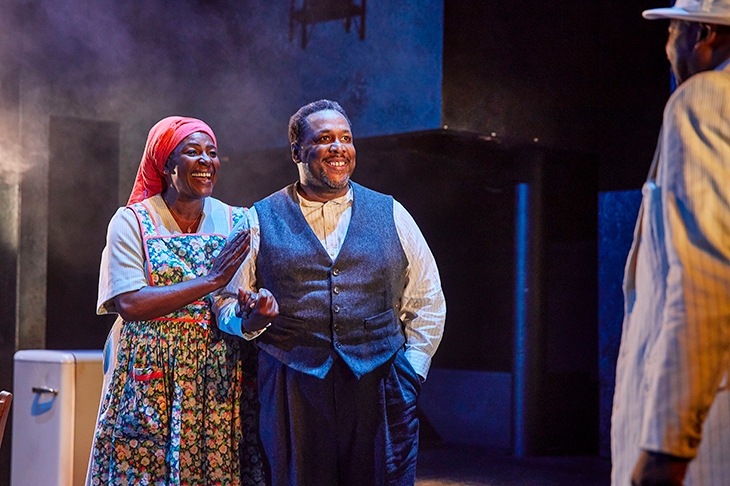Colour-blind casting is a denial of history. The Young Vic’s all-black version of Death of a Salesman asks us to believe that an ordinary African-American chap living in Brooklyn in 1928 might have owned a Chevrolet, and that a black businessman in the 1940s would consider asking a friend for ten grand to purchase a ranch in Texas. Younger viewers may assume that US society has been racially integrated for nearly a century. Is that the right message?
Willy Loman, the duffer at the play’s core, is one of American drama’s least attractive heroes. A preachy, devious, boastful, fawning, angry, narcissistic misery guts, he’s professionally incompetent and morally bankrupt. His only friend, his wife, is an aproned halfwit who finds his presence intoxicating even though no one else can bear him. He cheats on her, of course, with a hooker who laughs like a walrus. Even his choice of sex workers is dodgy. Wendell Pierce plays Willy as a cuddly bumbler and his sweetness does much to detoxify the role. The magnificent Sharon D. Clarke does her best as the wife, Linda, which means beaming inscrutably while occasionally mending her tights.
The play’s first act is a tricky blend of memory speeches, spectral visitations and flashbacks to Willy’s days as a young dad which require his grown-up sons to play themselves as kids. Always painful to watch adult thesps larking about as nippers and here the clunkiness is accentuated by freeze-frame effects and loud CLICKS to indicate that family photos are being snapped. Co-directors Marianne Elliott and Miranda Cromwell have laid on a wrist-slashingly gloomy set. Willy’s home looks like the Batcave or a gents’ urinal inside the Pyramids. A collection of henges and granite plinths serve as the walls and even the bedding in the Loman household. No wonder Willy’s down in the dumps. He sleeps on a kerbstone. The lighting is gruesomely funereal too.
In the second half, the drama picks up and the concluding scenes are powerfully rendered. Worth a night out. If you don’t wish to know the ending, avoid looking at the title, but the story is pitched as a tragedy about capitalism. In truth, Willy isn’t a victim of the free market but of bad career advice. Job in a laundry? He’d have been fine.
Henry IV Part 1 looks like a pillow-up-the-jumper am-dram effort. Hal and Falstaff, both played by women, stride up and down the boards shrieking their lines at the sky without interacting, or even looking at each other. It’s hard to grasp that this is an Elizabethan Secret Millionaire. A royal prince has joined a crew of drunken mercenaries who are plotting to mug some pilgrims as an amusing pastime in between real-life battles. Sarah Amankwah’s Hal has a surfeit of biddable chirpiness but no hint of introspection, still less of majesty. She’s miscast, perhaps. Certainly mis-costumed. She’s togged up as a chic commando, in a scarlet beret and matching jacket, like an aerobics teacher at a 1980s disco. There are levels of pathos and rumination in Hal that this production can’t fathom.
Helen Schlesinger’s Falstaff has a mane of grey hair, pale bloomers and bootikins. She’s all superficial shoutiness at first, like a lawnmower in pantaloons, and she later ruins the ‘What is honour?’ speech by overdoing a call-and-response routine with the audience. But she has charisma and personality, and she starts to find all kinds of melancholy riches in the part. She’s a clown, a liar and a mischief-maker but a loner as well, an ageing outcast forced to find companionship in the sawdust and spit of the tavern. This is one of truest Falstaffs I can recall. And one of the funniest.
Michelle Terry grabs the role of Hotspur by the horns and gives it a vicious and thrilling edge. I wasn’t convinced by her Hamlet last year and I’m not sure she was either, but this role, almost the mirror image of the dawdling Dane, demands simplicity and guts. She puts across Hotspur’s venomous ire, his crazed jealousy and his horrible pangs of self-doubt with electrifying clarity. All she’s missing is a sense of absence. In scenes not starring Hotspur, she prowls the boards brooding conspicuously. The company should tell her to can it.
Class is an import from Ireland written by Iseult Golden and David Horan. Brian and Donna are working-class Dubliners whose snooty teacher, Mr McCafferty, informs them of their son’s dyslexia. The couple are separated. Brian wants to patch things up. Donna’s not so sure. Perhaps their son’s diagnosis will help repair the breach. What begins as a civilised chat between the parents and the schoolmaster descends into a row about social division and the dictatorial hypocrisy of the teaching profession. Violence is threatened. Lawsuits are promised. The show’s cop-out ending is its only fault. This is a terrific slice of social comedy.







Comments